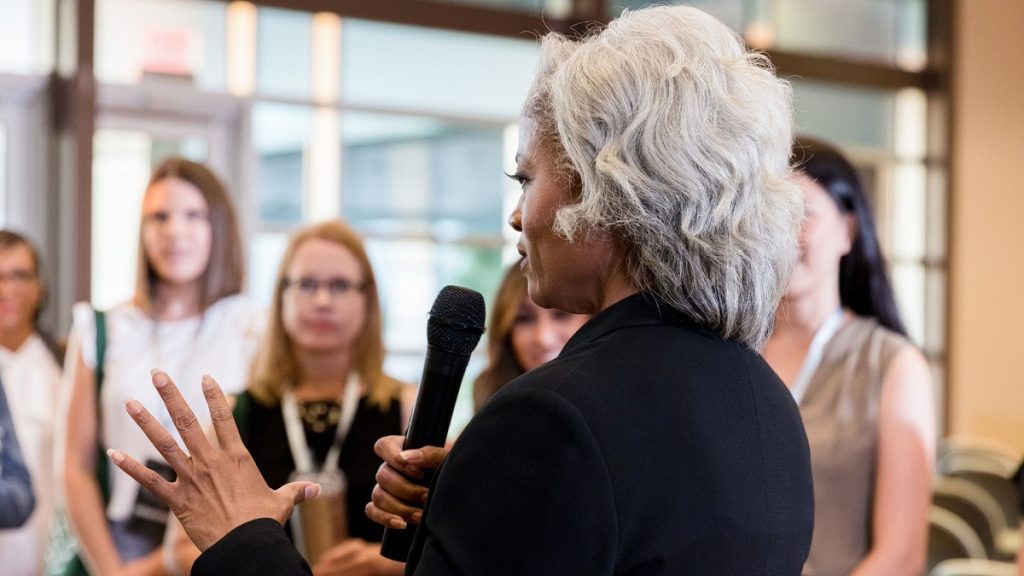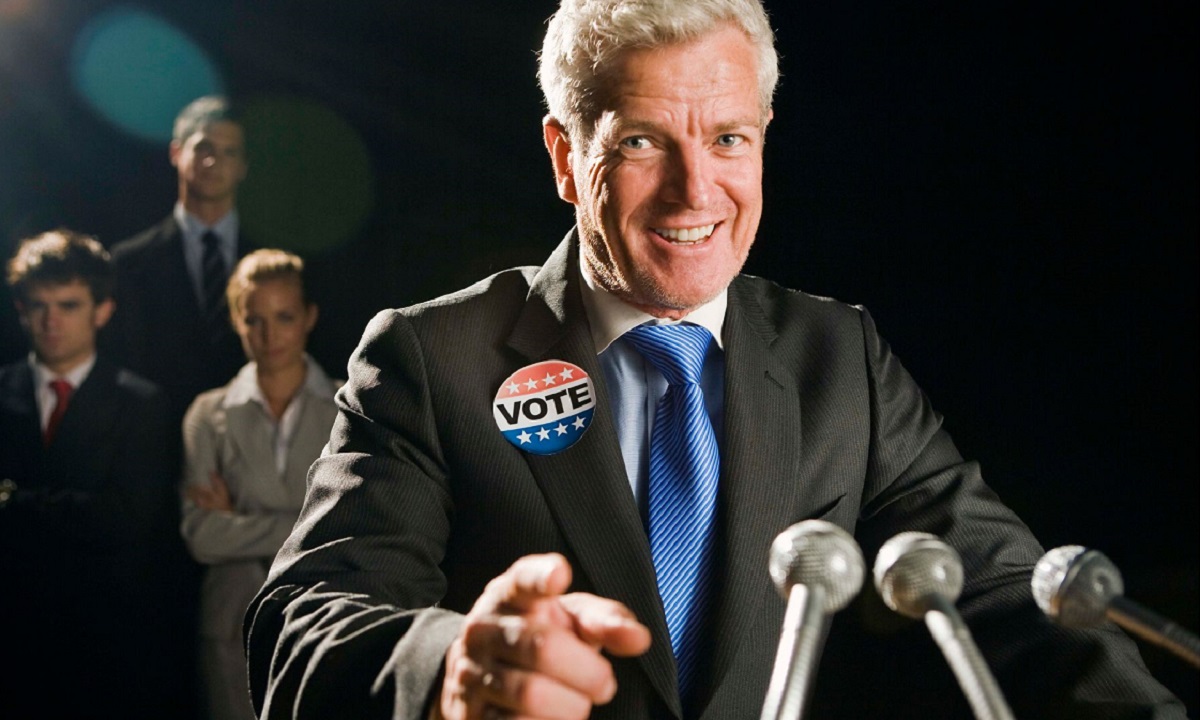A political campaign stump speech is given by a candidate for political office to introduce themself to the audience and present their platform. The speech is short and to the point, with plenty of personal stories, humor, and emotional appeal to the audience. It is often repeated throughout the campaign to smaller audiences.
In the world of politics, a good stump speech stands as an integral tool for fundraising or candidates vying for public office or as part of a presidential campaign. This enduring tradition, spanning decades and continents, serves as a platform for politicians to captivate and sway their audiences.
From addressing key issues to showcasing their vision for the future, the stump speech has evolved into a defining aspect of political campaigns, empowering candidates to rally support and leave lasting impressions on the electorate.
What Is The Difference Between A Campaign Speech And A Stump Speech?
The terms “campaign speech” and “stump speech” are often interchangeable, but a subtle difference exists between the two. A stump speech is the equivalent of an elevator speech intended to make an introduction and summarize the essence of what a candidate has to offer.
It is a standard speech politicians give, while campaign speeches go into more detail and may vary between audiences.
Stump Speeches
The term “stump speech” originates from the practice of candidates standing on a literal tree stump or platform while delivering their speech in outdoor settings. Stump speeches tend to be more focused and streamlined, highlighting key messages and core talking points the candidate wants to convey consistently to different audiences.
Abraham Lincoln was known for effectively using stump speeches during his political career. He would often deliver these speeches while standing on a literal stump or platform, addressing crowds of voters directly. Lincoln’s stump speeches were concise, straightforward, and focused on connecting with the common people.
Ronald Reagan’s political addresses were optimistic and uplifting. He was a clear and persuasive speaker who intertwined strong conservative ideology with effective use of storytelling and skillful injections of humor.

Campaign Speeches
A campaign speech refers to a broader category of speeches a political candidate delivers during an election campaign. These speeches can take various forms and are typically tailored to specific audiences or events. Campaign speeches are often designed to appeal to a diverse range of voters the candidate encounters at rallies, town hall meetings, debates, or other campaign events.
What Is The Purpose Of A Political Campaign Speech?
The purpose of any political campaign speech is to establish a personal connection with voters by sharing relatable stories and experiences while presenting the candidate’s policy positions and vision for the future persuasively. It is a most effective way of inspiring trust, garnering support, and persuading voters to choose the candidate as the most qualified and capable leader for the office they seek.
A political campaign speech also serves as a platform for candidates to address critical issues and challenges facing the community, showcasing their understanding of these problems and their proposed solutions.
Through their speech-making abilities, candidates aim to rally their base, sway undecided voters, and demonstrate their leadership qualities and ability to effectively govern, ultimately seeking to secure the necessary support for a successful campaign.

What Should The Content Of A Campaign Speech Be?
The content of a campaign speech should include a combination of personal anecdotes and stories that resonate with voters, highlighting shared experiences and values, as well as the candidate’s policy positions and proposals to address major issues and challenges facing the community.
Furthermore, a campaign speech should emphasize the candidate’s vision for the future, inspiring hope and optimism while instilling trust and confidence in their leadership abilities. Effective rhetorical techniques, such as persuasive language and powerful storytelling, can captivate the audience, leave a lasting impression, and generate enthusiasm and support for the candidate’s campaign.
Speechwriters play a crucial role in crafting solid stump speeches and political speeches for candidates on the campaign trail. They work closely with the candidate and their campaign team to develop a compelling message that resonates with the audience and aligns with the candidate’s goals and values.
What Type Of Speech Is A Campaign Speech?
A campaign speech is a persuasive address delivered by a political candidate during an election, aiming to engage and mobilize the audience in support of their campaign. It combines informative elements, presenting policy positions and proposals while employing persuasive techniques to sway voters.
These speeches serve as platforms for candidates to showcase their leadership qualities, establish personal connections with voters, and demonstrate their credibility. Candidates inspire trust and gain support from the audience by addressing key issues and presenting a compelling vision for the future.
What Should You Say In A Campaign Speech?
In a campaign speech, addressing critical community issues and presenting the candidate’s proposed solutions effectively is crucial. The speech should also highlight the candidate’s vision for the future, inspiring hope and establishing a personal connection with the audience through relatable stories and experiences.
Additionally, emphasizing the candidate’s qualifications, accomplishments, and relevant experiences is essential to showcase their suitability for the office they seek. It is important to appeal to the values and aspirations of the voters and conclude the speech with a strong call to action, urging the audience to support the campaign through voting, volunteering, or contributing.
For his candidacy, Republican Donald Trump used direct and confrontational language and populist messaging. His simple and repetitive slogans, such as “Make America Great Again” and “America First.” helped to convey his key messages and rally support among his base.

How Do You Start Off A Campaign Speech?
To start off a campaign speech, you can begin by acknowledging the audience and expressing gratitude for their presence, showing your appreciation for their support, much like Democratic Presidential Candidate Barack Obama did in his campaign speeches.
Provide a compelling and relatable anecdote or story that captures the essence of your message, connecting it to the aspirations and concerns of the people you aim to represent.
Following that, transition into a clear and concise statement of your campaign’s core values and priorities. Use this opportunity to outline the key issues you plan to address and explain how your policies and proposals align with your values and goals.
How Long Should A Campaign Speech Be?
A campaign speech’s ideal length varies depending on the context and audience but generally ranges from 10 to 30 minutes. It should be concise and immediately capture the listeners’ attention, holding their interest throughout.
To effectively engage the audience and convey your message, focus on delivering a speech that is long enough to cover your key points but short enough to maintain the audience’s attention and leave a lasting impression.
What Is The Difference Between A Political Campaign Speech And A Speech At A Press Conference?
A political campaign speech is a public address delivered by a candidate during an election campaign to engage and mobilize voters. It aims to convey the candidate’s message, policy positions, and vision for the future in a persuasive manner, typically lasting from 10 to 30 minutes.
On the other hand, a speech at a press conference is an opportunity for politicians to address the media directly, often in response to specific events or issues. These speeches tend to be more focused and concise, lasting a few minutes or less, as they are designed to provide information, answer questions from journalists, and shape the narrative around a particular topic or incident.

What Should You Do If You Are Giving A Campaign Speech And The Audience Isn’t Responding Well?
If you are giving a campaign speech and the audience isn’t responding well, you can take several steps to remedy the situation:
- Maintain your composure and project confidence even if the audience reaction is not what you expected.
- Assess the audience’s mood and engagement level. If they seem disinterested or unresponsive, consider adjusting your delivery style.
- Find ways to establish a personal connection with the audience. Share relatable stories, use humor, or ask thought-provoking questions to draw them into the speech.
- If you sense specific concerns or objections from the audience, address them directly. Acknowledge their perspectives, provide clarifications, and present your viewpoint in a respectful and persuasive manner.
- Adjust your content. If the audience is not responding well, evaluate your content and messaging. Ensure that you are addressing topics that are relevant and meaningful to them.
What Do You Do If You Lose Your Voice During A Campaign Speech?
If you lose your voice during a campaign speech, it can be a challenging situation, but there are steps you can take to handle it:
- Losing your voice can be frustrating, but it’s crucial to remain calm and composed. Take a brief moment to gather yourself and maintain a confident demeanor.
- Politely inform the audience that you are experiencing voice difficulties. Use gestures or non-verbal cues to indicate the situation, such as holding up a hand or pointing to your throat.
- Take a momentary pause to allow your voice to rest and recover. Take slow, deep breaths to relax your vocal cords.
- If possible, have a backup plan in place. Consider having a colleague or team member step in to continue delivering the speech on your behalf.
- If your voice is strained but still audible, focus on engaging the audience through non-verbal means. Exaggerate your facial expressions, gestures, and body language slightly to convey your message.

